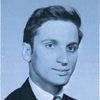Gary Saul Morson – 50th Reunion Essay
Gary Saul Morson
 2215 Payne Street
2215 Payne Street
Evanston, Illinois 60201
g-morson@northwestern.edu
847-502-2763
Spouse(s): Ewa Hauser (1970-76), Miriam Jane Ackerman (1980-96), Katharine M. Porter, (2003-present)
Child(ren): Emily, (1989), Alexander, (1995)
Education: 1969, Henry Fellow at Oxford (no degree); PhD Yale 1974.
Career: 12 years professor at University of Pennsylvania, since then at Northwestern.
Avocations: Magic the Gathering, which I played, and still play, with my daughter
College: Pierson
The older I get, the more remarkable I find one aspect of Yale in those years that decisively shaped my life. The humanities, and especially the study of literature, was the prestige field. I even remember people being embarrassed at studying the sciences, much less something practical. In all my years of university teaching, I have not seen that anywhere else. It made a big difference in my choice first of English, then Russian literature as my field and career.
I remember studying in the library and experiencing a high of the sort that, I assumed, others got from drugs. I would go over to the shelves in the reserve book room and wish I had time to read so many of those books. That is how I decided to become a literature professor, and it was clearly the right choice for me. I will soon be 70, but have no thought of retiring.
I have been enthusiastic about both research and teaching. The nice thing about having tenure is that I could read and write about anything I wanted. So I wrote a philosophical book about the nature of time, a book on how our love of famous real or apocryphal quotations help to shape culture, and, with an economist as co-author, about the advantages and shortcomings of economics as a way of thinking about human life. Not to mention a book of parodies of Russian culture. It has all been a lot of fun.
I always thought I would become a good teacher, more or less, but at Northwestern either I became a very good one or (more likely) my way of doing things fit the student culture. That is the main reason I turned down outside offers. I wound up teaching the largest course at the university on, of all things, Russian novels. The key for me has been to get pre-professional students to recognize the wisdom they could get out of great literature and to love reading it.
I have also tried to convey the idea John Stuart Mill stated: “He who knows only his own side of the case knows little of that.” If one is interested in the truth, or the policies that will do the most good, one needs to hear the best arguments on the other side. It was a belief I remember that our class accepted and which, for me, was reinforced by my study of the Soviet Union. That is why I have felt deep sadness that universities have become enemies of diversity of viewpoint, with Yale itself playing a less than glorious role. It is no longer the Yale we knew.
Since I did not grow up with much of a family, my own has meant a lot to me. I have good friends, and I would love to reconnect with more of my classmates of 1965–69. There is something about length of acquaintanceship, even with interruptions, that helps people reflect on the whole course of a life.
If the above is blank, no 50th reunion essay was submitted.
